Last week, employees at Duke University Press, the scholarly publishing arm of Duke University, announced the organization of the DUP Workers Union. Recognized as a leader in progressive scholarship, Duke University Press publishes books, journals and digital collections in vital disciplines including anthropology, feminist studies, queer studies, Black studies, Native and Indigenous studies and critical ethnic studies.
We are two supporters of the DUP Workers Union. Joshua has been at the Press for almost three years, and is at the beginning of his career as a book editor. Patty, who has worked at the Press for nearly twenty years, is one of the Press’s core staff in digital product management. Although we work in different departments and are at different points in our careers, both of us are committed to what a union can provide: equity for all staff members of the Press.
We didn’t know much about unions when this organizing effort started, and what we did know was informed by the negative stereotypes portrayed in movies and on TV. But we soon learned that a union is simply an organized group of workers who collectively make decisions about their work conditions, and negotiate those decisions with their organization’s management. A union can result in not only better workplace conditions, but a more stable and positive work environment for the entire organization. In the United States, all workers have a right to form a union without fear of punishment or retaliation from their employer. And although management often refers to unions as a third party that disrupts communication between workers and their managers, the truth is that a union is the workers. As the saying goes, a union is only as strong as its members.
We both love the Press and the work it publishes, and it is because of that love that we are organizing with the Washington-Baltimore News Guild, Local 32035 of C.W.A., to make the Press an even better workplace. We support a DUP Workers Union that advocates for fair and equitable treatment of all employees, and we want to make Duke University Press a more welcoming place for people of color, LGBTQ people and other marginalized folks by foregrounding equity and inclusion and reducing discrimination. We support fair compensation, adequate training and staffing, transparent decision-making processes and employee protections.
Both of us joined the organizing efforts for similar reasons. Joshua was first drawn to the Press because of its commitment to publishing life-affirming scholarship in queer studies. Although he works in a department with a thoughtful director and has a direct supervisor who advocates for him, he knows that not everyone at the Press receives such support. This is why he believes in a union: to ensure that all staff at the Press have an advocate. Patty’s path at Duke University Press has taken her through three departments and a number of managers. While her experience has been largely positive and without struggle, she knows that there are workers who are not given the opportunities and consideration that she has often taken for granted. Patty believes that a union will give all Press workers an opportunity to have their voices heard and their needs and challenges considered.
We have been deeply moved by the outpouring of support that the DUP Workers Union has received since going public. Over 300 authors, editors and contributors to Duke University Press books, journals and editorial collectives have signed a letter in support of the union, and the DUP Workers Union has been endorsed by The Duke Faculty Union, The Duke Graduate Students Union, The Durham Association of Educators, Durham City Council Member Charlie Reece, Durham County Commissioner Nida Allam and Durham Mayor Pro Tempore Jillian Johnson. In particular, the overwhelming support from authors and contributors highlights how workers’ rights and collective organizing are central to the politics and progressive brand of Duke University Press’s publishing program.
Duke has not at this point voluntarily recognized the DUP Workers Union, a concerning development given the University’s history of anti-union measures. This lack of recognition is itself a way to fight the creation of a union. In this time of financial austerity during the COVID-19 pandemic, and in light of the broad support from the Press’s authors and editors, we hope that Duke will not prioritize the allocation of resources toward anti-union efforts, and instead engage in productive and collaborative discussions with DUP Workers Union representatives.
One of the most heartening things about this union organizing effort has been the way it has brought staff at Duke University Press into closer communication as we’ve talked about our concerns, our hopes for the future and our questions about what it means to be a union. For most of us at Duke University Press, our work, even before the pandemic, only brought us into contact with a small subset of our colleagues on a day-to-day basis. Through organizing we’ve learned so much more about the challenges our colleagues have faced and the disparate ways departments within our organization operate. This has brought solidarity and understanding that did not exist before, as well as deeper connections between us.
We are committed to the mission of Duke University Press and to our work, and we are confident that the DUP Workers Union will soon be recognized by the University so we can begin the task of negotiating a contract. We encourage Duke students, alumni and faculty to read the DUP Workers Union mission statement and the eloquent testimonials shared by our coworkers. Duke undergraduate students, graduate students and research staff can register their support here, industry publishing professionals can here and we invite you to engage with us on social media @DUPWorkersUnion.
In solidarity,
Patty and Joshua
Patty Chase and Joshua Gutterman Tranen are staff members at Duke University Press, and supporters of the DUP Workers Union.
Get The Chronicle straight to your inbox
Sign up for our weekly newsletter. Cancel at any time.

